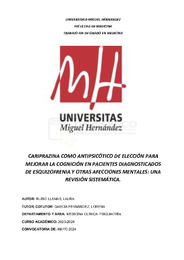Please use this identifier to cite or link to this item:
https://hdl.handle.net/11000/33754Cariprazina como antipsicótico de elección para mejorar la cognición en pacientes diagnosticados de esquizofrenia y otras afecciones mentales: una revisión sistemática
| Title: Cariprazina como antipsicótico de elección para mejorar la cognición en pacientes diagnosticados de esquizofrenia y otras afecciones mentales: una revisión sistemática |
| Authors: Rubio Llamas, Laura |
| Tutor: García Fernández, Lorena |
| Editor: Universidad Miguel Hernández |
| Department: Departamentos de la UMH::Medicina Clínica |
| Issue Date: 2024-05-04 |
| URI: https://hdl.handle.net/11000/33754 |
| Abstract: Introducción Los trastornos psicóticos, y en especial la esquizofrenia, constituyen un grupo de enfermedades que afecta a diferentes dominios y áreas específicas, clasificando la aparición de los síntomas positivos negativos y cognitivos. Todos estos dominios, deben de ser considerados como síntomas independientes. La cariprazina es un fármaco de reciente incorporación al grupo de antipsicóticos cuya característica diferencial es que se trata de un agonista parcial de los receptores de dopamina D2/D3. Estudios realizados in vitro en animales ya han demostrado una mayor actividad procognitiva y no solo una mejora en síntomas positivos y negativos. Objetivo Describir si los pacientes diagnosticados de esquizofrenia y trastorno bipolar en tratamiento con cariprazina presentan mayores efectos beneficiosos sobre la cognición que cuando son tratados con otros antipsicóticos. Metodología Revisión sistemática llevada a cabo con unos criterios de inclusión y exclusión tales como: que todos los artículos seleccionados se trataran de ensayos clínicos aleatorizados, realizados en humanos, no más de 10 años desde su publicación, usanod dosis de cariprazina de 1.5-6 mg/día, en lengua inglesa y los publicados hasta el 31 de diciembre del 2023. Los términos MesH utilizados en todas ellas fueron "cariprazine" "and “cognit" y "schizophrenia" y como filtro “humans”. Resultados Para los resultados y posterior discusión, fueron seleccionados un total de 5 artículos. En la mayoría de ellos se obtuvieron datos positivos a favor del uso de la cariprazina en el dominio de la cognición medida a través de la escala PANSS, así como sobre otros factores como son los síntomas positivos y negativos. Discusión En todos los estudios se obtuvieron resultados significativos a favor de la cariprazina sobre la mejoría en la cognición, pero en la mayoría de ellos solo comparaban cariprazina con placebo y no con otros fármacos antipsicóticos. Por ello, la generalización de los resultados a la eficacia o no del uso de la cariprazina frente al uso de otros antipsicóticos quedaba sesgada. Conclusiones La cariprazina utilizada a dosis bajas 1.5-3mg/día ha arrojado resultados significativos y favorables en cuanto a la mejora en la cognición, sobre todo en el ítem Marder desorganizado de la escala PANSS, pero se necesitan más estudios que utilicen escalas específicas y estandarizadas para sacar conclusiones sobre dicho efecto y eliminando las sesgos y limitaciones. Introduction Psychotic disorders, and especially schizophrenia, constitute a group of diseases that affect different domains and specific areas, classifying the occurrence of positive negative and cognitive symptoms. All these domains should be considered as independent symptoms. cariprazine is a drug recently added to the group of antipsychotics whose differential characteristic is that it is a partial agonist of dopamine receptors D2/D3. In vitro studies in animals have already shown increased procognitive activity and not just an improvement in positive and negative symptoms. Objective: To describe whether patients diagnosed with schizophrenia and bipolar disorder treated with cariprazine have greater beneficial effects on cognition than when treated with other antipsychotics. Methodology Systematic review carried out with inclusion and exclusion criteria such as: that they were randomized clinical trials, conducted in humans, no more than 10 years from their publication, at cariprazine doses of 1.5-6 mg/day, in English and those published until December 31, 2023. The MesH terms used in all of them were "cariprazine", "and "cognit" and "schizophrenia" and "humans" as a filter. Results: A total of 5 articles were selected. In most of them, positive results were obtained in favor of the use of cariprazine in the domain of cognition measured through the PANSS scale, as well as on other factors such as positive and negative symptoms. Discussion In all the selected studies, significant results were obtained in favour of cariprazine on the improvement in cognition, but most of them only compared cariprazine with placebo and not with other antipsychotic drugs. Therefore, the generalization of the results to the efficacy or non-efficacy of the use of cariprazine compared to the use of other antipsychotics was biased. Conclusions cariprazine used at low doses 1.5-3mg/day has yielded significant and favourable results in terms of improvement in coginition, especially in the disorganized Marder item of the PANSS scale, but more studies using specific and standardised scales are needed to draw conclusions about this effect and eliminate biases and limitations. |
| Keywords/Subjects: Esquizofrenia cariprazina cognición trastornos mentales |
| Knowledge area: CDU: Ciencias aplicadas: Medicina |
| Type of document: info:eu-repo/semantics/bachelorThesis |
| Access rights: info:eu-repo/semantics/openAccess Attribution-NonCommercial-NoDerivatives 4.0 Internacional |
| Appears in Collections: TFG- Medicina |
.png)

